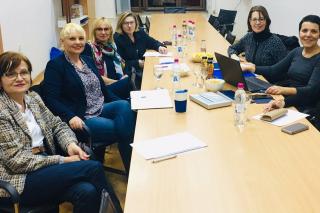Professor Erdelez tells us how this study hopes to improve the lives of Alzheimer's patients and their caregivers.
Dr. Sanda Erdelez, Professor and Director of the School of Library and Information Science (SLIS) within the College of Organizational, Computational, and Information Sciences (COCIS), presented at the BOBCATSSS conference in Osijek, Croatia in January. BOBCATSSS is an annual symposium in the field of library and information science organized under the auspices of EUCLID (European Association for Library and Information Education and Research).
In collaboration with colleagues from the University of Osijek, Dr. Erdelez presented a paper, “The Use of Online Discussion Forums by People with Alzheimer’s Disease and their Caregivers,” reporting the first stage of quantitative analysis of the posts on an online discussion forum focused on the problems experienced by people affected by Alzheimer’s disease and their family members. They found that the most frequent posters and the patients being discussed in the posts were predominantly female.
The follow up qualitative analysis will explore the most prominent themes in the content of the online discussion posts. This study is part of a larger international research project on which Dr. Erdelez collaborates with an interdisciplinary team from the University of Osijek to identify information needs of the caregivers of Alzheimer’s patients.
"As the world population ages, Alzheimer’s disease is becoming an endemic that affects an increasing number of people across social and national borders," says Erdelez. "It is a progressive and incurable disease with a long term impact on patients, family members and other caregivers. Librarians and information professionals need to be ready to serve as a resource to affected populations throughout the stages of this difficult disease. With the applications of methodologies of human information behavior research we can uncover specific needs for medical, psychological, legal, financial, social services and other types of information as the disease progresses. This knowledge is critical for development of information support systems from public libraries to various government and non-profit agencies. I am glad I can represent SLIS and Simmons in this international project."

